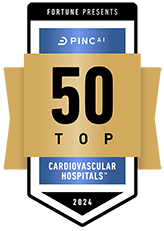An electrocardiogram (ECG or EKG) is one of the simplest and fastest procedures used to evaluate the heart. Electrodes (small, plastic patches) are placed at certain locations on the chest, arms, and legs. When the electrodes are connected to an ECG machine by lead wires, the electrical activity of the heart is measured, interpreted, and printed out for the physician's information and further interpretation. An EKG is a quick, noninvasive method of assessing the heart’s function.
Other related procedures that may be used to assess the electrical activity of the heart include exercise electrocardiogram, Holter monitor, signal-averaged ECG, loop recorders and pacemaker evaluations.
Reasons for the Procedure
Some reasons for your physician to request an ECG include, but are not limited to, the following:
- to identify irregular heartbeats, or arrhythmias
- to assess how well an implanted pacemaker is functioning
- to determine the cause of chest pain
- to evaluate other signs and symptoms which may be heart-related, such as fatigue, shortness of breath, dizziness, or fainting
- to determine the status of the heart prior to procedures such as surgery and/or after treatment for conditions such as a heart attack (myocardial infarction or MI), endocarditis (inflammation or infection of one or more of the heart valves), or after procedures such as heart surgery or cardiac catheterization
- to determine the effectiveness of certain heart medications
- to obtain a baseline tracing of the heart's function during a physical examination that may be used as a comparison with future ECGs, to determine if any changes have occurred
Related Procedures
Certain conditions such as arrhythmias (abnormal heart rhythms) may occur only intermittently, or may occur only under certain conditions, such as stress. Arrhythmias, or dysrhythmias, of this type are difficult to capture on an ECG that only runs for a few minutes. For this reason, the physician will request a specialized EKG procedure to allow a better opportunity to capture any abnormal beats or rhythms that may be causing the symptoms. These tests may include:
Holter Monitor
A Holter monitor is used to monitor the ECG tracing continuously for a period of 24 hours or longer. Some Holter monitors may record continuously but also have an event monitor feature that patients activate when symptoms begin to occur. While wearing the Holter monitor, patients are asked to keep a diary of activities and symptoms.
Event Monitoring
Event Monitoring is a procedure very similar to Holter monitoring in that patients are asked to wear a monitoring device for 24-48 hours. Unlike the Holter monitor, however, which records continuously throughout the testing period, the event monitor does not record until the patient feels symptoms and triggers the monitor to record an ECG tracing at that time. Some types of event monitors automatically record rhythms when symptoms are rare or suspected to occur during sleep. After patients experience symptoms and record them, they send the recording of the event to their physicians or to a central monitoring center by telephone. They also keep a diary of symptoms and corresponding activities experienced while wearing the monitor.
Loop Recorders, or Memory Loop Recorders
These event monitors have a feature which captures a short period of time prior to the moment the patient triggers the recording to a moment right afterwards. This feature can help the physician determine more details about the possible change in the ECG at the time the symptoms started and what was happening with the ECG just before the patient triggered the recorder.
Signal-Averaged Electrocardiogram
A signal-averaged electrocardiogram is a more detailed type of ECG. During this procedure, multiple ECG tracings are obtained over a period of approximately 20 minutes in order to capture abnormal heartbeats which may occur only intermittently. A computer captures all the electrical signals from the heart and averages them to provide the physician more detail regarding how the heart's electrical conduction system is working.
Our Cardiovascular Program continues to receive recognition as one of the top programs nationally. We are honored to provide high-quality, effective care for even the most high-risk patients.
-
Check Out Our Heart and Vascular Program Awards and Recognition
In its 2024 Specialty Excellence Awards, Healthgrades recognized Froedtert Hospital as one of America’s 50 Best Hospitals for Cardiac Surgery, one of America’s 100 Best Hospitals for Cardiac Care and one of America’s 100 Best Hospitals for Coronary Intervention, as well as other specialty achievements in various areas.

For the second year in a row, Froedtert Hospital was identified as one of the nation’s 50 Top Cardiovascular Hospitals™ according to an independent quality analysis based on a balanced scorecard provided by PINC AI™, and reported by Fortune. The hospitals recognized in the top 50 operated at lower cost and had better outcomes, recording significantly higher inpatient survival rates, fewer patients with complications, lower readmission rates and up to nearly $10,000 less in total costs per patient case. According to the study’s analysis, if all hospitals operated at the level of this year’s top performers, there could be 7,600 fewer deaths due to heart disease, 6,700 fewer bypass and angioplasty patients who suffer complications, and more than $1 billion in costs saved for the 2024 study year. Froedtert Hospital was ranked in the category of top teaching hospitals with a cardiovascular residency program. In this cohort of hospitals, Froedtert Hospital was ranked No. 4 in the country. No other hospital in Wisconsin was recognized with this national distinction.
The Society for Vascular Surgery's Vascular Quality Initiative (SVS VQI) has awarded Froedtert Hospital three out of three stars for its active participation in the Registry Participation Program. The mission of the SVS VQI is to improve patient safety and the quality of vascular care delivery by providing web-based collection, aggregation and analysis of clinical data submitted in registry format for all patients undergoing specific vascular treatments. The VQI operates 14 vascular registries.
The American Heart Association recognized Froedtert Hospital with its Get With the Guidelines® Heart Failure Gold Plus Award. In addition, the hospital was recognized on the AHA’s Target: Heart Failure(SM) Honor Roll and received the AHA’s Target: Type 2 Diabetes Honor Roll™ award.
The American Heart Association also recognized Froedtert Hospital with its Get With the Guidelines® — Coronary Artery Disease Mission: Lifeline STEMI Receiving Silver Plus and Mission: Lifeline NSTEMI Silver awards. These awards demonstrate our commitment to improving care by adhering to the latest treatment guidelines and streamlining processes to ensure timely and proper care for heart attacks.
The American Heart Association recognized Froedtert Hospital with its Get With the Guidelines® AFib Gold Award.
The Cardiovascular Intensive Care Unit (CVICU) and Neurosurgical Intensive Care Unit (NICU) at Froedtert Hospital have each received a silver-level Beacon Award for Excellence from the American Association of Critical-Care Nurses. This award recognizes unit caregivers who successfully improve patient outcomes and align practices with AACN’s six Healthy Work Environment Standards. Receiving this national three-year award with gold, silver and bronze designations, marks a significant milestone on the path to exceptional patient care and achieving a healthy work environment.





